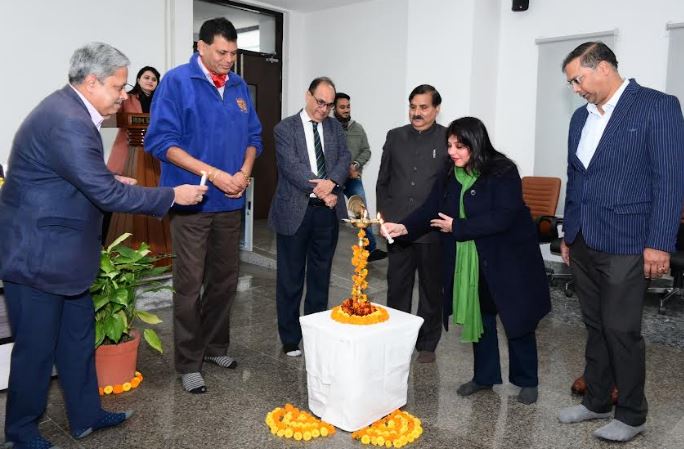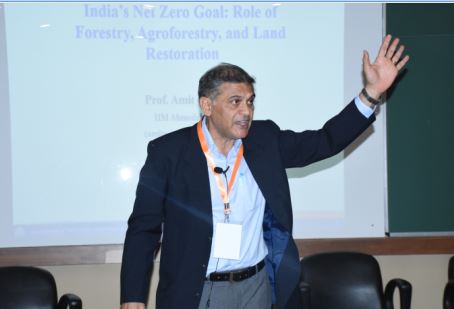11, Jan 2024
IIT Roorkee Hosts International Workshop on Social Determinants of Lifestyle Related Chronic and Non-Communicable Diseases
· Unraveling the Complexities of Non-Communicable Diseases in Adult Women
· IIT Roorkee’s Endeavor in Tackling Lifestyle-Related Diseases
· Unveiling Health Realities: Women’s Chronic Challenges
11, 01, 2024: The Department of Humanities and Social Sciences, Indian Institute of Technology Roorkee (IIT Roorkee) organized an enlightening workshop titled “Social Determinants of Lifestyle Related Chronic and Non-Communicable Diseases among Adult Women in India.” The event took place on the 10th of January 2024 at the Dept. of HSS Auditorium, IIT Roorkee.

The workshop commenced with an Inaugural Session featuring esteemed guests and experts in the field.
The Director of IIT Roorkee, Prof. K. K. Pant, expressed his enthusiasm for the workshop, stating, “Guided by a legacy of 176 years, IIT Roorkee stands as a beacon of excellence, continually striving to illuminate the path of knowledge and societal progress. In hosting events like the International Workshop on Social Determinants of Lifestyle-Related Diseases, we not only bridge academia with real-world challenges but also reaffirm our commitment to shaping a healthier and more enlightened society. Focused on addressing the escalating burden of chronic diseases, especially among vulnerable populations, this initiative aims to bridge research gaps and deliver evidence-based solutions. By concentrating on women of reproductive age in northern states, the project seeks to disseminate vital health knowledge and make a lasting impact on individuals, communities, and states. This workshop underscores IIT Roorkee’s commitment to societal well-being and the pursuit of knowledge that transcends boundaries.”
The Chief Guest, Dr. Sanjeeb Kumar Patjoshi, IPS, Government of Kerala, delivered an insightful address, emphasizing the importance of interdisciplinary collaborations to address the complex issue of lifestyle-related diseases. He remarked, “IIT Roorkee’s initiative to delve into the social determinants of health is commendable. Such collaborations between academia and industry are pivotal for developing effective strategies to tackle health challenges in our society. He also emphasised pivotal role of rural Panchayats and almost 14 lakh women elected representatives in these local self governments in awareness campaign, aggregating data, secondly focusing on nursing staff mostly women in India for their hands on experience insights in this research.”
The Inaugural Session was marked by the presence of key figures, including Prof. Anindya J. Mishra, the Convener, extending a warm welcome to guests, and Prof. S. P Singh, Head of Humanities & Social Sciences, offering insights into the department’s significance. Prof. Sabu S. Padmadas, the International Principal Investigator from the University of Southampton, provided a comprehensive overview of the project, while Co-Principal Investigator Prof. Tapas Mishra outlined impactful pathways. Notably, the session also highlighted the crucial roles of Co-Convenors Prof. Pooja Garg and Prof. Falguni Pattanaik, emphasizing their pivotal contributions to the organization of the workshop. This collaborative effort of distinguished individuals exemplifies the workshop’s commitment to excellence and the seamless coordination essential for its success.

The workshop, graced by esteemed resource persons like Dr. Yutaro Setoya of WHO, Prof. Pradyot Ranjan Jena from NIT Surathkal, and Dr. Swati Sharma from VIT Chennai Campus, showcases a convergence of global perspectives on NCDs and co-morbidities. Their valuable insights contribute to a nuanced understanding of lifestyle-related chronic diseases among adult women in India. This event not only underscores IIT Roorkee’s commitment to academic excellence but also emphasizes its dedication to societal contributions. The inclusion of international perspectives, represented by Prof. Sabu S. Padmadas and Prof. Tapas Mishra from the University of Southampton, highlights the institution’s global outreach and collaborative ethos. The workshop’s sessions, led by eminent speakers like Prof. Anand Krishnan and Mrs. Kusum Ghildiyal, delve into critical aspects of gender and non-communicable diseases, utilizing population-level datasets and addressing intricate social determinants, reflecting the workshop’s diverse expertise.
The workshop concluded with valuable insights during the Deliberations and Way Forward session, led by Dr. Tulika Bhattacharyya from the Japan International Cooperation Agency (JICA) India Office.
Prof. Anindya J. Mishra, the Convener of the workshop, expressed his gratitude, stating, “This workshop has provided a platform for rich discussions and collaborative efforts to address the social determinants of lifestyle-related diseases among women. I am thankful to all the participants for their valuable contributions.”
The event concluded with a Vote of Thanks by Prof. Anindya J. Mishra, and participants left with a sense of collective commitment towards addressing the challenges highlighted during the workshop.
The International Workshop not only demonstrated IIT Roorkee’s commitment to addressing societal challenges but also highlighted its excellence in fostering interdisciplinary collaboration. The event served as a beacon of the institution’s legacy and its ongoing contribution to the betterment of society for over 176 years. IIT Roorkee continues to play a pivotal role in shaping the future, not just through technological advancements but also by addressing critical social issues that impact lives.
- 0
- By Rabindra
14, Dec 2023
Advancing Towards Net Zero: International Workshop at BITS Pilani Goa sheds Light on Forestry and Agroforestry Strategies”
National, 13th Dec, 2023: The Department of Humanities and Social Sciences of BITS Pilani Goa, in partnership with the IUCN CEM Forest Specialist Group, CEM South Asia, the Goa State Biodiversity Board, and CEEW, New Delhi has successfully hosted a One-day International Consultative Workshop titled ” ‘Role Of Forestry, Agroforestry, And Land Restoration in Achieving Net Zero in the Asian Region’.
The primary objective of the workshop was to formulate a comprehensive roadmap or guideline document for assessing the pivotal role of forestry and agroforestry-based strategies in supporting national Net Zero Goals. Furthermore, the workshop aimed to identify challenges, hurdles, and roadblocks hindering the realization of mitigation potential from these sectors. It also sought to foster collaboration and partnerships among various organizations in Asia dedicated to these sectors.

The event saw participation from distinguished guests like Professor Mohan Kumar B, Former Vice Chancellor of Arunachal University and one of the authors of the National Agroforestry Policy, and Prof. Amit Garg, Professor, Indian Institute of Management, Ahmedabad. The event also witnessed the participation of Mr. Namgyel Wangdi, Senior Programme Officer of Bhutan Ecological Society, as a speakers. Mr. Wangdi shared insightful perspectives on Bhutan’s remarkable success in attaining the Net Zero goal, emphasizing the significant contribution of the forest sector. The workshop welcomed the Chief Wildlife warden of the State of Goa Mr. Umakant and Dr. Pradip V Sarmokdam, Nodal Officer, Climate Change, State of Goa. Additionally, the workshop welcomed Mr. Anindya Bhattacharya, Celestial Earth, the agency entrusted with formulating the Net Zero Strategy for the state of Goa.
Speaking on the occasion, Prof. Dr. Rajiv Kumar Chaturvedi, Associate Professor BITS- Pilani, Goa Campus said, “Different modelling studies suggest that despite best efforts and most optimistic scenarios, there will still be considerable residual emissions towards the second half of the century, in this context forest sector can play an important role in bridging a part of this emission gaps”. He further said, “BITS Pilani’s Goa campus has considerable expertise in this area and we are associated with India’s official national Greenhouse gas inventory programme.”
As we reflect on the success stories shared, let us collectively harness the wisdom of Bhutan’s accomplishments, ensuring that our state reaps the full benefits of sustainable practices and learnings from there. I emphasized the idea of ‘think global but act local,’ meaning we should have big goals but also take practical steps in our own communities. This guides our work as we try to manage and care for forests in the best way possible.”
Setting the broad context for Net Zero, Prof. Amit Garg, IIM Ahmedabad said The Government of India has made commitments to reduce emissions and increase non-fossil electricity generation. It’s like setting goals for a better future. Achieving Net Zero by 2070 is a big challenge, but with smart state-level policies, it’s possible. I’m encouraged by Gujarat’s commitment to becoming Net Zero by 2070, showing that change is happening at the regional level for a greener tomorrow.
The discussions centred around the critical role of agroforestry, Land-Use Change, and Forestry (LULUCF) sector in achieving Net Zero goals on both national and global scale.







